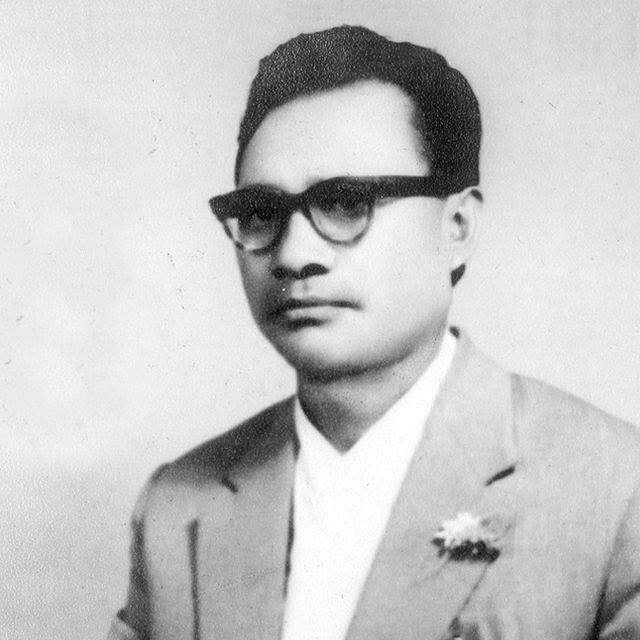MY FATHER
By: Vidhan Ratna Yami (From Dharma Ratna Yami Smmriti Grantha BS 2046)
My beloved father was such a well-known political figure that I wish I had been born earlier so that I would have known him better in the peak of his political career when he was the “Upa” Minister for Forestation in the Second Cabinet of His Majesty’s Government after the ultimate fall of the aristocratic Ranas. I still remember very well in St. Xavier’s Jawalakhel School, how proud I felt when Father Downing introduced me to his American guests as a minister’s son.
The political career that I know of him was when he was nominated a member of the Rashtriya Panchayat (National Assembly) for four consecutive years by his late Majesty, King Mahendra. He was also appointed a member of an official committee to distribute about 4 bighas of the Terai land property each to the political sufferers of the Rana period revolution. He realized how fortunate he was and how not everyone who fought to overthrow the Ranas could share in the power or the economic opportunities after the Rana overthrow.
As a “Bhoot Purva Mantri” he was invited to a lot of special functions and embassy parties. I remember being taken a lot to parties in the Indian and Chinese embassies in the capital city.
He held a very ardent interest in state politics. It was not nagar politics, district politics nor anchal politics he was interested in. He used to say regret that the rashtra politics in Nepal was dominated by the international politics – be that of aid, ideology or considerations of strategy.
My daddy was a prolific writer of novels, poetry and religion. His Newari epic entitled “Sandeya Lisa” (meaning the reply of the country of Tibet) and Newari historical novel “Bhrikuti Tara” are in the Tribhuvan University Newari Course. His Newari epic like “Arhat Nanda” is also in the Newari Syllabus. He wrote a lot in Nepali as well although he did not fetch any prizes in that particular language. He penned a few pamphlet size books in English on his political thoughts. One of his optimistic desires was that he would have gotten a much wider readership if his books had been translated into English. He wrote on the Buddhist philosophy also. He went to attend a lot of literary functions and was an outspoken orator. I remember in one of the functions in Lalitpur when he described and praised much the efficient role of the Bajracharyas (the Newar Buddhist High Priests) in preserving authentic Buddhism in Kathmandu Valley.
My father proved to be a very overwhelming personality. He was very human indeed. One of his books on Buddhism translated into Hindi as well was “Buddha Manis Hun” (signifying Buddha was a man). Whenever I came home on vacation, my father took me to his political and literary friends and would talk on and on for hours. He liked to be entertained and he loved to entertain. He always loved “Momocha” parties. He possessed a colossal sense of humor.
My father was a social reformer or rather he tried to reform the Nepalese society by all means. He wrote and spoke against the blind following of rituals and against the lavish spending of money on a lot of “bhoj’s.” He wrote plenty on the superb philosophies including Brahmanism and Hinduism. He was an efficient spokesman for the downtrodden class the “Dalit Varga” precisely.
My sweet remembrances of my father would be incomplete without mentioning on the description of him and my beloved mother together. They formed a great pair for sure. There occurred tumultuous clashes of opinion. Their’s appeared as a dynamic and perfect relationship. My father was the idealist whilst my mother just the antithesis, the pragmatist and woe if ever one trespassed into each other’s domain. Our education and our upbringing was my mother’s domain as well as the practical household affairs. My father’s domain was the outside world, the world of politics, literature and travels in India. When my mother passed away very sadly, my father felt a huge loss in life. He just could not stand it at all.
My personal remembrances of my dear father will forever be stamped by his historic fight for life in his death bed in Bir Hospital --- the first nursing home ever established in the history of Nepal. He did not expedite to perish yet and he was literally snatched away by fate or whatever awaiting on the long run.
He was an ardent speaker against injustice, mismanagement and I can still remember his loud voice in the Bir Hospital cabin room, discussing politics, literature or hospital bureaucracy with the visitors who came to see him.
-----*-----
(Vidhan is the only son and the second child of late Dharma Ratna Yami. He is a Civil Engineer by any profession. He also belonged to the Cambridge Batch of 1965 in Godavari High School.)
